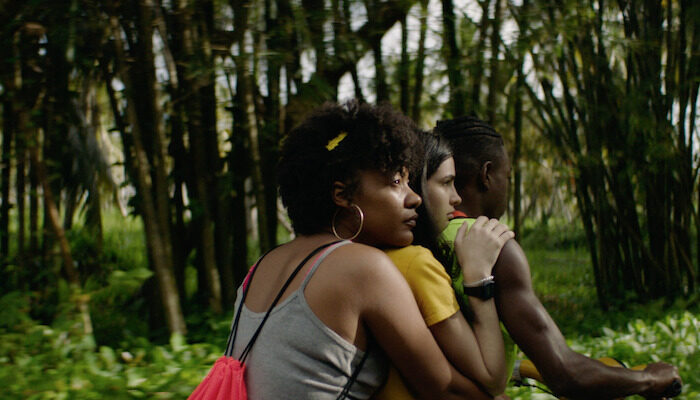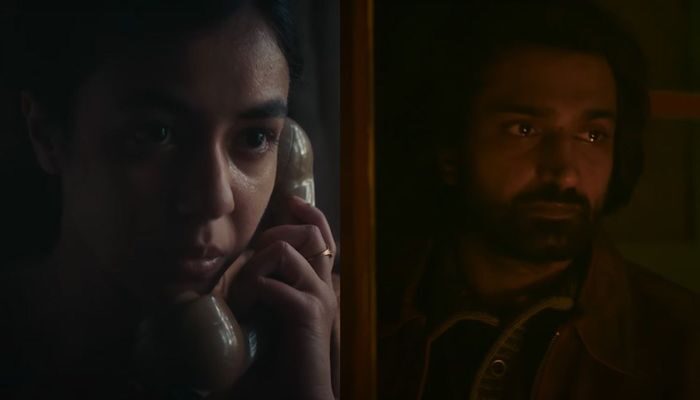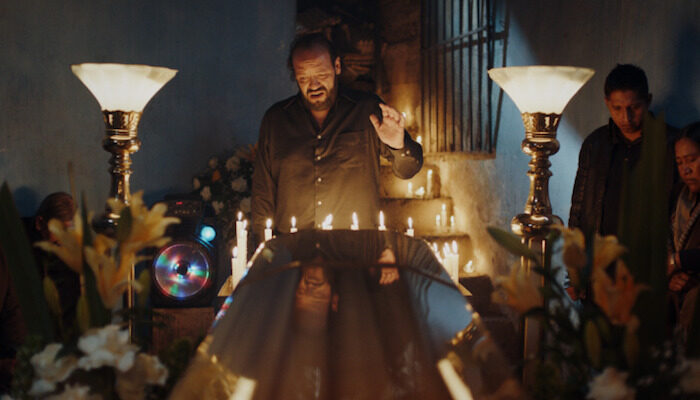Film Review: CARAJITA: Tragedy Blurs the Lines Between Caste, Love & Liability [Tribeca 2022]
Carajita Review
Carajita (2021) Film Review from the 21st Annual Tribeca Film Festival, a movie directed by Ulises Porra and Silvina Schnicer, written by Ulises Porra, Ulla Prida, and Silvina Schnicer, and starring Cecile van Welie, Magnolia Nunez, Richard Douglas, Javier Hermida, Dimitri Rivera, and Eduardo Martinez Sturla.
Carajita (‘Sweetie’) essentially concerns a love triangle, a nanny, Yarisa, caught in the middle between her privileged charge, Sarah, and her estranged daughter, Mallory.
By extension, this film also examines Yarisa caught in the crossfire between two families, one who employs her, and the other, her own.
Prodigal Mother: Yarisa
There is plenty of guilt to go around, to be sure, when Mallory was struck down while walking home alone after a party, and not without a certain irony. The individuals involved are good people and deal with their portion of blame in different ways. The story begins from the viewpoint of Sarah, voicing her hopes that ‘Yari’ (her pet name) will return to the family fold in spite of her tragic loss.
Yarisa essentially reared Sarah and her older brother, Alvaro, in their native Argentina, from which the family emigrated to Yarisa’s native Dominican Republic, where Mallory eagerly awaits her. Under the guise of professional conduct, Yarisa discourages Mallory from visiting on the premises. Only at first do we find Yarisa’s coldness startling.
But after a moment’s thought we realize that on one hand, Mallory, a remote symbol of her own impoverished past, threatens Yarisa’s privileged status as a charter family member, conferred by her rich employer. But Yarisa has yet to face the guilt imposed by the affection she feels for Sarah through her years of service, and the shame she feels for not confronting the issue sooner.
Middle Child Syndrome: Mallory
Yarisa’s only biological child is in sort of a limbo, fully acknowledged but lacking an edge of recognition as many ‘middle’ kids are. Mallory’s confrontations with Yari come off as pretty soft, considering. She’s hurt, yet concedes well enough to her mother’s commitment to her employers. But she also demands to know the reason why Santa (Yari’s given name among her own people) has generally ignored her own family in general, and Mallory herself in particular. Soon, however, the mother-daughter bond gets restored.
With the air of genuine noblesse oblige, Sarah and Alvaro invite Mallory along to a party, and while there they give more than due attention to their guest. Mallory accepts with high spirits; she and Alvaro dance with equal fervor; later, she and Sarah have a sisterly heart-to-heart in the garden, where each candidly acknowledge their class differences without rancor, after which Mallory decides to walk home alone.
Of Guilt and Goats: Sarah
Sarah’s affection for Yari is reciprocal, as might be expected; Yari’s relationship over the years allows her to be several things to Sarah all at once: a godmother, older sister, and doting headmistress. And Sarah is a nice kid, rebellious now and then, but maybe a bit more sensible than most.
Throughout the film, a herd of goats, and especially the billy, figure prominently. This was an interesting choice by the filmmakers, but also something of a teaser. As one of the first domesticated animals, the goat has a presence that is both symbolic and pragmatic, both universal and varied, almost contradictory. They are particularly revered in Caribbean culture; they best represent prosperity and allowed to run free, which fits the narrative in Carajita. As symbolism, however, these animals might come off as a bit too ambiguous.
For Sarah, however, one billy goat has special significance. Driving home alone in the pouring rain after clumsy back-seat sex with her boyfriend, she strikes something in the road. At once the goat emerges into the headlights and gallops off down the road. Startled but not worried, she drives home. The next day, Mallory is discovered face-down in a puddle, victim of a hit-and-run.
Same Track, Different Stations
Up to the point of Mallory’s demise, life pretty much coasts along with sultry serenity. Sarah’s family rallies behind Yari in her sorrow, opening their home and treating her like one of her own. They attend Mallory’s wake in what looks like a shanty town, a telling contrast to the sunny beaches and balmy breezes where Sarah and family have their palatial abode.
Mallory’s wake ceremony at her homestead in shanty town is quite a shock, a fascinating ritual full of gusto, percussion, and exultant mystic chanting and song. This seems to portend the critical mass of suspicion building among Mallory’s family, especially her cousin, the single voice who spares no venom when accusing Alvaro of failing in his duty to drive Mallory home. Sarah’s family bears these recriminations with the dignified stoicism of their class; they show their respect by way of retreat.
Meanwhile, Mallory’s family scours the site where she was found for evidence of foul play, but Yari could not care less. She’s in her own world of grief, mulling over her own failures adding to the tragedy, eventually surrendering to gut-wrenching wails, bent over on the beach, her face in the sand. Sarah attempts to reach her, perhaps to confess that she may have been responsible for her daughter’s death, but her father prevents her, to give Yari space to grieve.
IMO
We never do discover if Sarah is in fact responsible; the point is, that Sarah feels that she is, and the mere possibility of her guilt would haunt her indefinitely. If the banality of evil often surprises us, the same can be said for complacency.
The lush tropical surroundings, and even grittiness of the shanty town lend the film a laid-back ambiance, at times the narrative gets obscured by the subtlety. The actors are natural and engaging, without exception. Overall, Carajita to be a fine example of cinéma vérité. Andres Rodriguez composed the remarkable, innovative score.
Rating: 8.75/10
Leave your thoughts on this Carajita review and the film below in the comments section. Readers seeking to support this type of content can visit our Patreon Page and become one of FilmBook’s patrons. Readers seeking more Tribeca Film Festival news can visit our Tribeca Film Festival Page, our Film Festival Page, and our Film Festival Facebook Page. Readers seeking more film reviews can visit our Movie Review Page, our Movie Review Twitter Page, and our Movie Review Facebook Page. Want up-to-the-minute notifications? FilmBook staff members publish articles by Email, Twitter, Facebook, Instagram, Tumblr, Pinterest, Reddit, and Flipboard.
Related Articles
FilmBook's Newsletter
Subscribe to FilmBook’s Daily Newsletter for the latest news!













